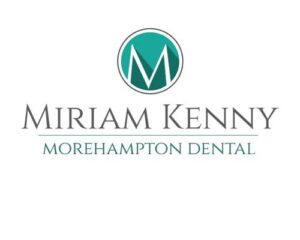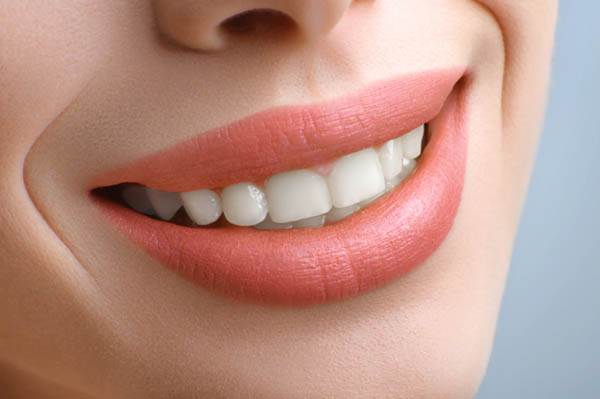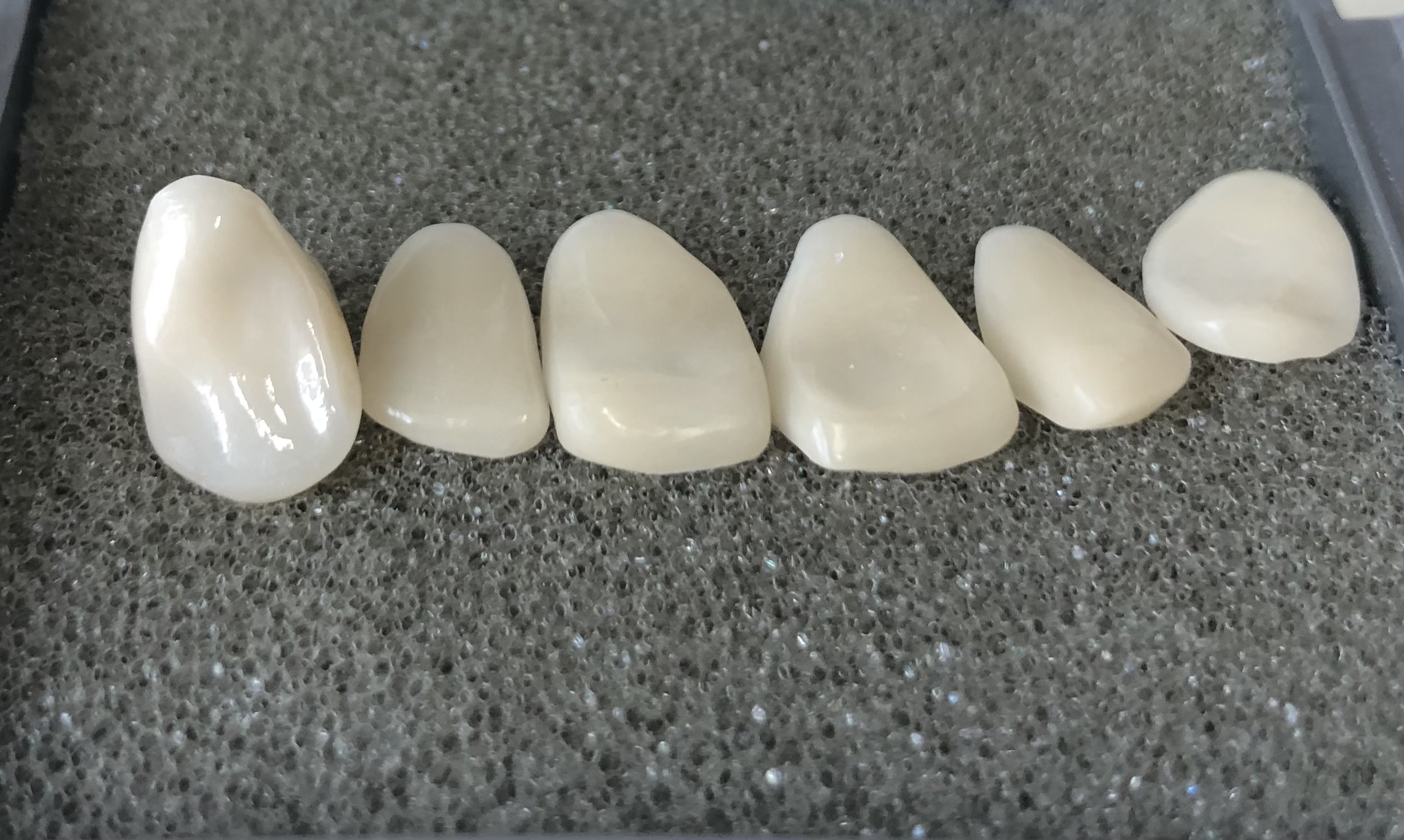Dental Veneers
Transform your teeth and give you the “Hollywood” smile you’ve always wanted.
What is a Dental Veneer?
Dental veneers are custom-made, thin layers or shells of tooth-colored material that stick to the front surface of your teeth to enhance their look, shape and colour. The primary function of veneers is the cosmetic correction of discolorations, gaps, out-of-shape, or chipped front teeth. Dental veneers can completely change a person’s smile and make them look more appealing. They require little to no tooth trimming and are an excellent investment if you want a long-lasting beautiful smile. Correctly done veneers can last up to 10-15 years.


Why are dental veneers used?
Dental veneers can be used in multiple circumstances, such as ;
Discoloured or stained teeth
Very small teeth
Broken or chipped teeth
Gap teeth
Misaligned teeth
Unusually shaped teeth
You can only get dental veneers if your teeth are healthy and free of gum disease or decay. Since veneers require trimming of tooth structure, you need to have sufficient enamel thickness (the tooth’s outermost layer) to get veneers. You should also not have any jaw clenching or teeth grinding habit, as this can easily fracture or chip your dental veneers. Our dentist will carefully inspect your teeth and tell you if you are suitable to get dental veneers or not.
The most common types of veneers available at the dental clinic are composite veneers and porcelain veneers.
Porcelain veneers: Porcelain veneers are the first choice for many when they want to go for dental veneers. They closely mimic the look, shade, and color of natural teeth and are custom-made for each patient. It is often impossible to differentiate between natural teeth and porcelain veneers. They are durable, long-lasting, and stain-resistant. Porcelain veneers can last well up to 10-15 years if maintained properly. They come in various shades and translucencies and require minimal trimming of the tooth structure (0.5 mm).
Composite Veneers: Composite veneers are more cost-effective compared to porcelain veneers. Our dentist can fabricate them in the office on the same day. They are made of the composite resin material that is used for fillings. Since composite veneers can wear out faster than porcelain veneers, they may last for a shorter time, 8 -10 years. They are less resistant to staining than porcelain veneers. The advantage of composite veneers is that if the veneer fractures or chips, it can be repaired, whereas porcelain ones cannot be repaired (they have to be entirely replaced).
Palatal Veneers: Sometimes, the teeth’ inside surfaces can get damaged due to forceful brushing, teeth grinding, acid erosion (in case of bulimia, acid reflux syndrome, and chronic vomiting), or an improper bite. In such cases, palatal onlays or palatal veneers are used to restore or fix the front teeth’ palatal (inside surface) aspect.
Crowns: Both dental crowns and dental veneers can cosmetically correct the shape, look, and color of teeth. Dental crowns cover all the tooth surfaces, whereas dental veneers cover only the front surfaces. Crowns are thicker and much more robust when compared to veneers, which are thin and can fracture if there is some heavy biting force or sudden impact.
Teeth Whitening: Tooth whitening can correct discolorations and the aesthetics of your teeth to some extent, but it is not as effective as dental veneers. However, Tooth whitening is more conservative of the natural tooth as it does not involve any cutting of tooth structure.
Orthodontic treatment: Dental veneers offer a quick fix for minor alignment problems. Orthodontic treatment can also correct alignment issues and improve a person’s smile tenfold. But the treatment usually takes time to work, often a year or two. Orthodontic treatment offers a comprehensive solution and corrects your aesthetics and your bite and jaw problems. In contrast, dental veneers are suited for those who require only cosmetic correction.
Happy Patients
We always strive to ensure that all our patients leave us smiling
Dental veneers procedure
What happens during a dental veneers procedure?
Our dentist will first trim your front tooth surfaces, take an impression ( mould) to send to the specialist dental technician who will create the custom made ceramic shells.
Then, at the next visit, an etching solution will be applied to the tooth to create a suitable surface for the veneer to stick better. We will leave it on for 10-15 s and then rinse it off with water.
Next, we will apply a strong bonding cement or adhesive on the tooth surface. Then, we place the dental veneer on the tooth and set it with a specialized light.
Finally, we will trim the excess material and adjust the tooth contours from all sides.
Are dental veneers needed?
Dental veneers are custom-made thin wafers or shells of tooth-coloured material that attach to the front teeth. They can completely change the look, colour, shape and appeal of natural teeth. Veneers can treat discolourations, gaps, chipped teeth, malformed and misaligned teeth.
The two most commonly available veneers are composite veneers and porcelain veneers. Both can mimic the look, colour and shade of the natural teeth; however, porcelain veneers are more stain-resistant than composite veneers.
- Need Assistance?
Practice Plan
frequently Asked Questions
Yes, you can use veneers to close gaps in your teeth, especially the front teeth. Veneers are a great option because they require very minimal tooth structure to be removed for placement than crowns.
Most dental insurances do not cover veneers as they come under cosmetic dental procedures. But some insurance companies may include it in special packages. Make sure you confirm with your insurance provider before opting for the treatment.
Dental bonding is a dental treatment for correcting various defects in the appearance of the front teeth. The treatment uses a tooth-coloured material (composite resin) to fix the cavity or defect. The material is molded and sculpted around the tooth contours while it is still soft. The dentist will then point a specialized blue light on it for 20 seconds per section to harden it. On the other hand, veneers are ready-made thin shells of composite or porcelain material attached to the teeth with a strong cement or bonding agent. Both treatments fix cosmetic defects in your front teeth and have their pros and cons. Your dentist will inform you which is more suited to your requirements.
Dental veneers can last a long time if you practice good oral hygiene and eating habits. Porcelain veneers can last for 10-15 years, whereas composite veneers can last for 8-10 years if you take proper care of them. Veneers can fracture if you use them to bite on hard foods or use them to tear into plastic packages. A sudden impact like trauma from a fall or during a sporting activity might also fracture them.
Your dentist will trim a thin layer from your teeth’ front surface to make a place for the veneers. Then, an etching solution will be applied that creates microporosity on the tooth surface. Finally, the dentist will use a bonding agent to the tooth and stick the veneers onto them.
You can get your veneers matched to your natural tooth’s shape, size, and color. It is up to you how many veneers you would like, but you typically need to get dental veneers on your front four, six or eight teeth for the best aesthetics.
Miriam Kenny Morehampton Dental Practice
Your Trusted Dental Clinic
- About Us
- COVID-19 Prepared
- Why Choose Us
Our practice is based on providing a high standard of modern dentistry in a friendly, professional manner. It is our mission to help our patients maintain their teeth and a healthy mouth for their lifetime.
Our entire team is committed to this ideal. As a result, a high percentage of our business is from returning patients and referrals of their family and friends. We welcome and are grateful for these referrals.

With the current Covid-19 pandemic we are paying particular attention to our normal cross-infection practices, but in addition, we are keeping the practice well ventilated (it may feel cold) and we use a special Fogging machine with Hypochlorous acid (HOCL) which is an all-natural antimicrobial agent made from salt and water by an electrolysis unit. Fogging of each surgery is carried out between patients after any treatment involving an aerosol.
To reduce aerosol production during procedures with the dentist we most often use a little device called a rubber dam —.50 this isolates the immediate teeth we are working with & protects the back of mouth. During hygienist treatment we are using an extra suction device outside of the mouth, this also reduces aerosol production.

The practice is owned & directed by Miriam Kenny and as the business owner and the principal healthcare professional, I am primarily interested in providing evidence-based dental healthcare. This means my priority is to help my dental patients to maintain their own natural teeth in a healthy mouth for their lifetime.
We can help improve your smile – we offer a range of options depending on what is most appropriate for you, from tooth whitening to composite bonding to ceramic veneers, crowns and bridges.

How Much do Dental Veneers cost?
At Miriam Kenny Morehampton Dental Practice we aim to provide state of the art, quality affordable dental treatment to all.
It was with this in mind that we created our affordable dental plans, which helps us to keep your teeth, gums and oral health in tip-top shape.
With our Practice Plan, you will attend every 6 months with the hygienist and once yearly for your dental examination and have no fees to pay at these visits. The cost of these visits is covered by your monthly subscription – this is as low as €14.50 or €21, depending on whether you qualify for the “PRSI” benefit.
| Treatment | Member of maintenance plan | Non-member of plan |
|---|---|---|
| Dental Crowns | €700-800 | €800-€900 |
| Dental Veneers | €800 | €900 |
| Tooth Whitening (night-time tray bleaching) | €250 | €350 |
Other Treatments you may consider
This is a gentle, effective and safe way to achieve a remarkable improvement in the colour of your natural teeth.
Fixes the worn tooth and the underlying cause which may lead to sensitivity, bite problems, yellow teeth, headaches, or jaw aches.
Resemble natural teeth and help restore damage by bacteria or heavy biting forces to their natural shape and look.
Custom-made cosmetic correction of discolourations, gaps, out of shape, or chipped front teeth. Long-lasting result







